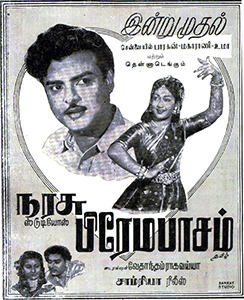Plot
Zamindar Narayana Pillai has two daughters, Prema and Tara, both of whom have been learning dance since childhood. Prema is especially fascinated by it, so Narayana Pillai builds a theatre and invites dance teachers from all over the country. Nagabhushnam, who is Narayana Pillai’s manager, has two sons: Ramakrishnan (Ramu) and Radhakrishnan.
One day, Ramu pushes Prema down a staircase, leaving her disabled. The enraged Narayana Pillai shoots Ramu, who falls into a river. After that, Narayana Pillai disappears, entrusting his property to Nagabhushnam. Nagabhushnam takes control of the property, leaving Prema and Tara as orphans.
Years pass. Prema works hard, studies, and takes care of Tara. Ramu returns as a burglar, under the name Krishna. Although he recognises everyone, he hides his identity. He meets Prema and they fall in love. After that, Krishna steals a necklace from Nagabhushnam and gives it to Prema. When Krishna reveals his true identity, Prema is falsely accused of the theft. She is angry and distances herself from him.
Meanwhile, Radhakrishnan and Tara fall in love. However, Nagabushnam intervenes — he warns Prema and forces Radhakrishnan and Tara to separate. Tara attempts suicide, but Krishna rescues her and promises to arrange her marriage with Radhakrishnan.
Krishna, determined to relieve Prema from her disability, enlists the help of his friend Rathnam and robs Nagabhushnam's house to fund her treatment. Nagabhushnam recognises him as his son Ramu and files a police complaint. Then, Prema regains her mobility and regrets her actions when she realises what Krishna has done. Krishna plans the marriage of Radhakrishnan and Tara. The police organise a dance performance by Prema, who agrees, on the condition that Nagabhushnam withdraws his case against Krishna.
Narayana Pillai, now a wanderer, also attends the performance. Krishna arrives in disguise. After the performance, Krishna successfully gets Radhakrishnan and Tara married, and then surrenders himself. Due to the tattoo on his arm, Krishna is recognised as Ramu. At last, Nagabhushnam apologises to Narayana Pillai and returns his property, which he gives to Ramu. Finally, the movie ends with the marriage of Ramu and Prema.
This page is based on this
Wikipedia article Text is available under the
CC BY-SA 4.0 license; additional terms may apply.
Images, videos and audio are available under their respective licenses.
